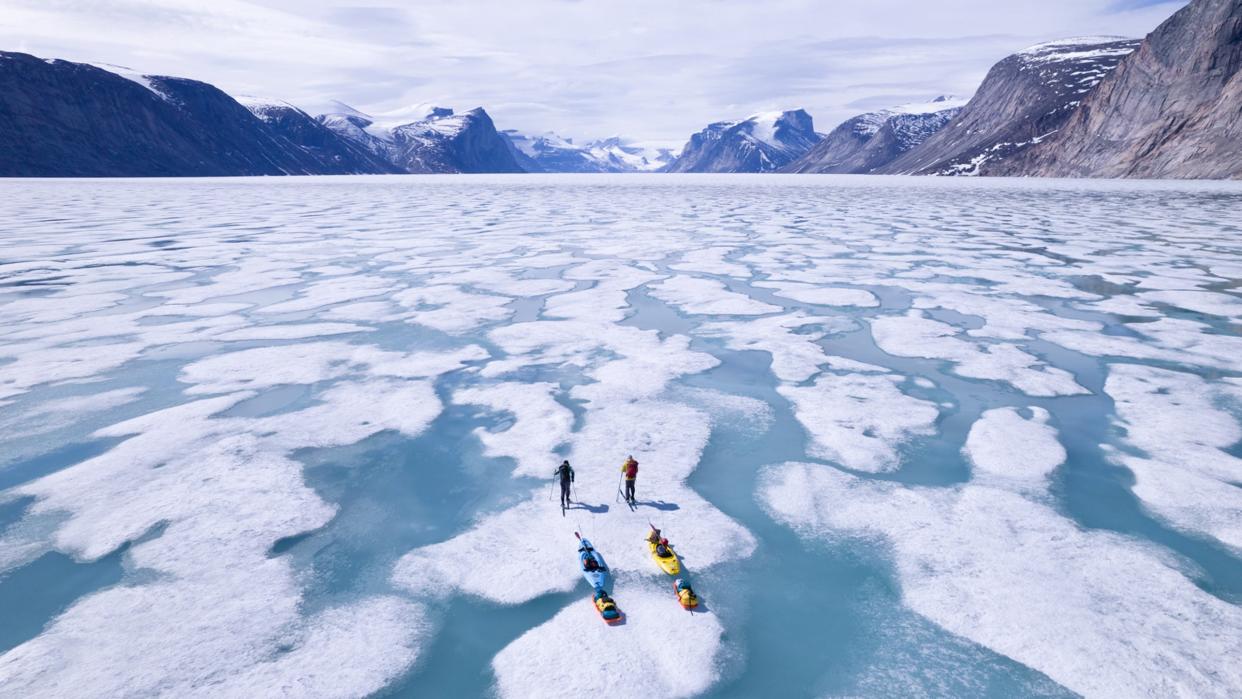Our 6 Favorite Films at the Banff Mountain Film Festival

This article originally appeared on Outside
The annual Banff Mountain Film Festival, held in the picturesque Canadian mountain town, is a celebration of creativity in the outdoor filmmaking word today. This year's edition started on October 29 and will go through this weekend--if you weren't able to attend it in person, you can buy an online pass to digitally screen the films, our wait for the World Tour to come to a town or city near you. Banff also kicks off the awards and festival seasons, so keep these films on your radar.
A Baffin Vacation (13 minutes)
"Consider taking your sweetheart to Baffin Island, it's surrounded by literally nothing," the narrator deadpans in the Wes Anderson-esque intro to A Baffin Vacation. In the film, sweethearts Erik Boomer, a noted expedition kayaker, and Sarah McNair-Landry, the youngest person to visit the North and South Pole, set off on a 70-day expedition in the heart of Baffin Island in the Canadian Arctic, crossing soon-to-melt ice sheets, climbing huge mountains, and paddling first descents. The two shot everything in the film themselves, and captured both stunning scenery and their own real-life emotions. We see McNair-Landry waiting in an eddy as Boomer runs a huge, never-before-paddled waterfall. She's trying to calm her own nerves and support her partner as she wrestles with the fear of what could happen and the reality of how far they are from rescue. The film is both funny and raw.
Beyond Begbie (15 minutes)
"We put names on places that have to do with the land, you'll never find an Indigenous place name that's after a person," says Shelly Boyd, a leader of the Sinixt First Nations Peoples, in Beyond Begbie. The film features Indigenous athletes and guides who unpack the colonization of the Canadian Rockies, and the legacy of white settlers who eliminated Native populations and named peaks and other landmarks. It looks most closely at Mount Begbie, the peak that sits above the town of Revelstoke--it is named after Sir Matthew Begbie, a judge known for sentencing Native men to death. Names matter, Boyd and others argue, and we can't get out from under colonialism until we excise the ghosts from the place names around us.
Sheri (24 minutes)
Pack rafts have become so ubiquitous in river running that you might not realize the raft's modern iteration was developed relatively recently by a middle-aged mom fighting chronic fatigue syndrome. "I took a lot of hits from people--I'm an older woman and I'm building boats," says Sheri Tingey, the founder of Alpacka Rafts. "I decided I'm going to let the boats talk for themselves." In Sheri, Tingey, who was also a ski bum, clothing company founder, and high-level kayaker, outlines the misogyny and dismissal she's faced, and the drive that kept her going. The most fun parts of the film are the snippets from her community and her co-workers, including her son, Thor, who now runs the company. They highlight what a fun, weird, hard-nosed iconoclast she is.
The Approach 2 (23 minutes)
Until recently, ski stoke films were often a stale repository of shots of white dudes sending, but thankfully that's starting to change. Filmmakers are bringing in more diverse skiers, and a needed dose of levity, humor, and reality. The opening scene of The Approach 2 lets you know that the film is part of that movement. It starts with adaptive skier Anna Soens stomping through pillowy powder on a sit ski, and makes you realize that an advantage of the device is the face shots. The film has plenty of serious skiing--for instance, Washington skier Sophia Rouches hucks the notorious Mount Baker Road Gap, and then heads straight to Alaska for big lines--but it also has needed context about how it can be hard to break into the ski world as someone who doesn't fit the able-bodied, white dude mold. "That's the thing about adaptive sports, we're constantly adapting," says Vasu Sojitra, one of the skiers featured in the film.
Deep in the Heart (100 minutes)
When I think about Texas, wildlife isn't the first thing that comes to mind, but Deep in the Heart showed me that my conception of the state was narrow and wrong. The film is narrated by actor Matthew McConaughey, whose dulcet tones verge on pornographic when he starts to talk about deer rutting season. It is lush, visually stunning, and surprising. The film is broadly about restoration and conservation: how threatened species like bison have come back from the brink of being wiped out; how the nearly mythical ocelot became so rare; and how people can make the future of wildlife diversity less grim. It covers the geographic breadth of the state, from the high plains, to the ocean, and it feels like David Attenborough's Planet Earth, if Texas was the whole planet.
The Hermit of Treig (78 minutes)
The outdoor world often romanticizes hermits. We love a remote cabin and a fire lookout. But we don't often talk about what happens when the folks who strike out on their own get older and need some support. Director Lizzie MacKenzie's emotional film, The Hermit of Treig, is about Ken Smith, a Scottish hermit who has lived in long cabin on the edge of remote Lake Trieg for 40 years. We see Smith, who is in his 70s, work through the beautiful and painful parts of living off the land alone, and think about what the rest of his time on earth might look like.
For exclusive access to all of our fitness, gear, adventure, and travel stories, plus discounts on trips, events, and gear, sign up for Outside+ today.

